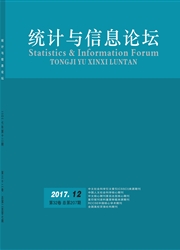

 中文摘要:
中文摘要:
基于685份外出务工农村劳动力样本的问卷调查数据,建立有序Logistic回归模型,分析外出务工农村劳动力个人及家庭特征、就业能力、就业风险、就业环境及就业条件等对其逆向回流行为的影响。结果显示:外出务工农村劳动力年龄越大,身体素质和文化水平越低,务工单位拖欠工资与签订合同情况越差,城镇政策体制环境、经济环境和文化环境越差,理想工作的择业门槛越高,外出务工劳动力越倾向于彻底逆向回流。因此,为实现农村剩余劳动力的彻底转移,应积极发展城镇第二、第三产业,改善城镇就业环境,降低农村劳动力在城镇务工的就业风险,同时有效提高农村劳动力的健康水平和文化素质。
 英文摘要:
英文摘要:
By establishment of ordered Logistic regression model, using the questionnaire data of 685 migrant rural labor force samples, the influence of migrant rural labor force individual and family characteristics, employment ability, employment risk, employment environment and employment conditions on the reverse flow behaviors of rural labor force was analyzed. According to the results, the more older and lower body quality and cultural level of the migrant rural labor force, more prevalent of no contracts and wage arrears, worse political system environment, economic environment and cultural environment of migrant workers in cities and towns and more stringent staff selection criteria of ideal Jobs, the more tend to completely reverse flow of migrant rural labor force. Therefore, in order to realize the complete transfer of rural surplus labor force, the towns and cities second and third industry should be actively developed and the urban employment environment should be improved, rural labor force employment risk in cities should be reduced. And the physical and cultural quality of rural labor should be effectively imoroved.
 同期刊论文项目
同期刊论文项目
 同项目期刊论文
同项目期刊论文
 期刊信息
期刊信息
